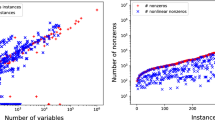Abstract
This paper describes solvers for specific quadratic programming (QP) tasks. The QP tasks in question appear in numerous problems, e.g., classifier learning and probability density estimation. The QP task becomes challenging when large number of variables is to be optimized. This the case common in practice. We propose QP solvers which are simple to implement and still able to cope with problems having hundred thousands variables.
Preview
Unable to display preview. Download preview PDF.
Similar content being viewed by others
References
Franc, V.: Optimization algorithms for kernel methods. PhD Thesis, Center for Machine Perception, K13133 FEE Czech Technical University, Prague, Czech Republic (July 2005) (to be submitted)
Franc, V., Hlaváč, V.: A Simple Learning Algorithm for Maximal Margin Classifier. In: Kernel and Subspace Methods for Computer Vision, workshop adjoint to the Int. Conference on Neural Netwoks, TU Vienna, August 2001, pp. 1–11 (2001)
Franc, V., Hlaváč, V.: Multi-class Support Vector Machine. In: Kasturi, R., Laurendeau, D., Suen, C. (eds.) 16th International Conference on Pattern Recognition, vol. 2, pp. 236–239. IEEE Computer Society, Los Alamitos (2002)
Gilbert, E.G.: Minimizing the quadratic form on a convex set. SIAM journal on Control and Optimization 4, 61–79 (1966)
Girolami, M., He, C.: Probability density estimation from optimally condensed data sample. IEEE PAMI 25(10) (2003)
Gonzales, L., Angulo, C., Velasco, A., Catala, F.: Unified dual for bi-class SVM approaches. Patter Recognition (2005) (article in press)
Keerthi, S.S., Shevade, S.K., Bhattacharya, C., Murthy, K.R.K.: A Fast Iterative Nearest Point Algorithm for Support Vector Machine Classifier Design. IEEE Transactions on Neural Networks 11(1), 124–136 (2000)
Kowalczyk, A.: Maximal margin perceptron. In: Bartlett, P.J., Schloköpf, B., Schuurmans, D., Smola, A.J. (eds.) Advances in Large-Margin Classifiers, pp. 75–113. MIT Press, Cambridge (2000)
Kozinec, B.N.: Recurrent algorithm separating convex hulls of two sets. In: Vapnik, V.N. (ed.) Learning algorithms in pattern recognition, Sovetskoje radio, Moskva, pp. 43–50 (1973)
Mitchell, B.F., Demyanov, V.F., Malozemov, V.N.: Finding the point of a polyhedron closest to the origin. SIAM journal on Control and Optimization 12, 19–26 (1974)
Schlesinger, M.I., Hlaváč, V.: Ten lectures on statistical and structural pattern recognition. Kluwer Academic Publishers, Dordrecht (2002)
Tax, D.M.J., Duin, R.P.W.: Data domain description by support vectors. In: Verleysen, M. (ed.) Proceedings ESANN, Brussels, pp. 251–256 (1999)
Author information
Authors and Affiliations
Editor information
Editors and Affiliations
Rights and permissions
Copyright information
© 2005 Springer-Verlag Berlin Heidelberg
About this paper
Cite this paper
Franc, V., Hlaváč, V. (2005). Simple Solvers for Large Quadratic Programming Tasks. In: Kropatsch, W.G., Sablatnig, R., Hanbury, A. (eds) Pattern Recognition. DAGM 2005. Lecture Notes in Computer Science, vol 3663. Springer, Berlin, Heidelberg. https://doi.org/10.1007/11550518_10
Download citation
DOI: https://doi.org/10.1007/11550518_10
Publisher Name: Springer, Berlin, Heidelberg
Print ISBN: 978-3-540-28703-2
Online ISBN: 978-3-540-31942-9
eBook Packages: Computer ScienceComputer Science (R0)




